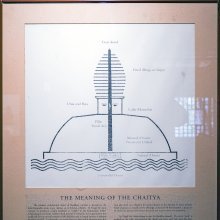Munti, Muṇṭi, Munṭī: 2 definitions
Introduction:
Munti means something in Hinduism, Sanskrit, Tamil. If you want to know the exact meaning, history, etymology or English translation of this term then check out the descriptions on this page. Add your comment or reference to a book if you want to contribute to this summary article.
Images (photo gallery)
In Hinduism
Shilpashastra (iconography)
Source: Shodhganga: The significance of the mūla-beras (śilpa)Munti is the name of a Gaṇa depicted in the Adi Kumbeswarar Temple (Ādi Kumbheśvara) in Kumbakonam (Kumbhakonam), representing a sacred place for the worship of Śiva.—The mūla-bera of the Ādi Kumbheśvar temple is liṅga. In the garbhagṛha, there is a liṅga with two Gaṇas named Danti and Munti.

Shilpashastra (शिल्पशास्त्र, śilpaśāstra) represents the ancient Indian science (shastra) of creative arts (shilpa) such as sculpture, iconography and painting. Closely related to Vastushastra (architecture), they often share the same literature.
Languages of India and abroad
Tamil dictionary
Source: DDSA: University of Madras: Tamil LexiconMuṇṭi (முண்டி) noun < Hindi muṇḍa. [Telugu: muṇḍi, K. moṇḍu.] Pertinacious beggar. See கல்லுளிமங்கன். [kallulimangan.] Local usage
--- OR ---
Muṇṭi (முண்டி) noun < muṇḍin.
1. Person with a clean-shaven head; மழித்த தலையினன். (திருவாலவாயுடையார் திருவிளையாடற் குறிப்பு.) [mazhitha thalaiyinan. (thiruvalavayudaiyar thiruvilaiyadar kurippu.)]
2. Barber; நாவிதன். (இலக்கியச் சொல்லகராதி) [navithan. (ilakkiyas sollagarathi)]
3. cf. puṇḍrin. One who wears a caste mark on his forehead; நெற்றியில் திரி புண்டரம் அணிந்தவன். நீற்றுப் பூண்டகு முண்டி யேடா [nerriyil thiri pundaram aninthavan. nirrup pundagu mundi yeda] (திருவாலவாயுடையார் திருவிளையாடற் [thiruvalavayudaiyar thiruvilaiyadar] 13, 14).
--- OR ---
Muṇṭi (முண்டி) [muṇṭittal] 11 transitive verb < muṇḍa. To shave the head completely; மொட்டை யாய்ச் சிரைத்தல். தலை முண்டிக்கு மொட்டரை [mottai yays siraithal. thalai mundikku mottarai] (தேவாரம் [thevaram] 423, 4).
--- OR ---
Muṇṭi (முண்டி) noun See முண்டனி. [mundani.] (நாமதீபநிகண்டு [namathipanigandu] 329.)
--- OR ---
Munti (முந்தி) < முந்து-. [munthu-.] noun
1. Front; முன்னிடம். [munnidam.]
2. See முந்தானை. பொதுமாதர் முந்தி யே தொடு மிடங்கள் [munthanai. pothumathar munthi ye thodu midangal] (திருக்குற்றாலத் தல மந்தமா. [thirukkurralath thala manthama.] 21). — adverb Some time before; முற்காலம். முந்தி வானோர்கள் வந்து [murkalam. munthi vanorkal vanthu] (தேவாரம் [thevaram] 477, 8).
Tamil is an ancient language of India from the Dravidian family spoken by roughly 250 million people mainly in southern India and Sri Lanka.
See also (Relevant definitions)
Starts with: Mumtidu, Mumtikku, Munticinor, Muntinu, Muntir, Muntira, Muntiram, Muntiri, Muntiri-p-palam, Muntirikkottai, Muntitam, Muntiviri, Muntiyavatti.
Ends with: Atimunti, Camunti, Chamunti, Coti-munti, Gumugumunti, Irattacamunti, Nirrumunti.
Full-text (+7): Mundi, Muntiviri, Coti-munti, Mundi mara, Atimunti, Zinki-mundi, Gorkh-mundi, Mundi gedde, Aane mundi, Jaganniyanta, Nar-mundi, Venkanan, Nirrumunti, Amurtta, Digantarim, Goura-mundi, Vaycceti, Sthanu, Dantin, Vishvatma.
Relevant text
Search found 15 books and stories containing Munti, Muṇṭi, Munthi, Mundi, Munṭī; (plurals include: Muntis, Muṇṭis, Munthis, Mundis, Munṭīs). You can also click to the full overview containing English textual excerpts. Below are direct links for the most relevant articles:
Tiruvaymoli (Thiruvaimozhi): English translation (by S. Satyamurthi Ayyangar)
Pasuram 8.5.7 < [Section 5 - Fifth Tiruvaymoli (Mayak kutta)]
Jainism in Odisha (Orissa) (by Ashis Ranjan Sahoo)
Jaina Antiquities at Budhapada (Khordha) < [Chapter 3: Survey of Jaina Antiquities in Odisha]
Structural Architecture < [Chapter 4]
The Jaina Temple of Choudhury Bazar, Cuttack City < [Chapter 3: Survey of Jaina Antiquities in Odisha]
Temples of Munnur (Historical Study) (by R. Muthuraman)
Images of Dvarapalas < [Chapter 5]
Yoga Vasistha [English], Volume 1-4 (by Vihari-Lala Mitra)
Chapter XXXVI - Description of the supreme deity parameswara < [Book VI - Nirvana prakarana part 1 (nirvana prakarana)]
Chapter LXI - On the identity of the world with infinite vacuity < [Book VII - Nirvana prakarana part 2 (nirvana prakarana)]
Chapter LXVII - Lecture on truth < [Book III - Utpatti khanda (utpatti khanda)]
Buddhacarita (by Charles Willemen)
The Vishnu Purana (by Horace Hayman Wilson)
Related products


